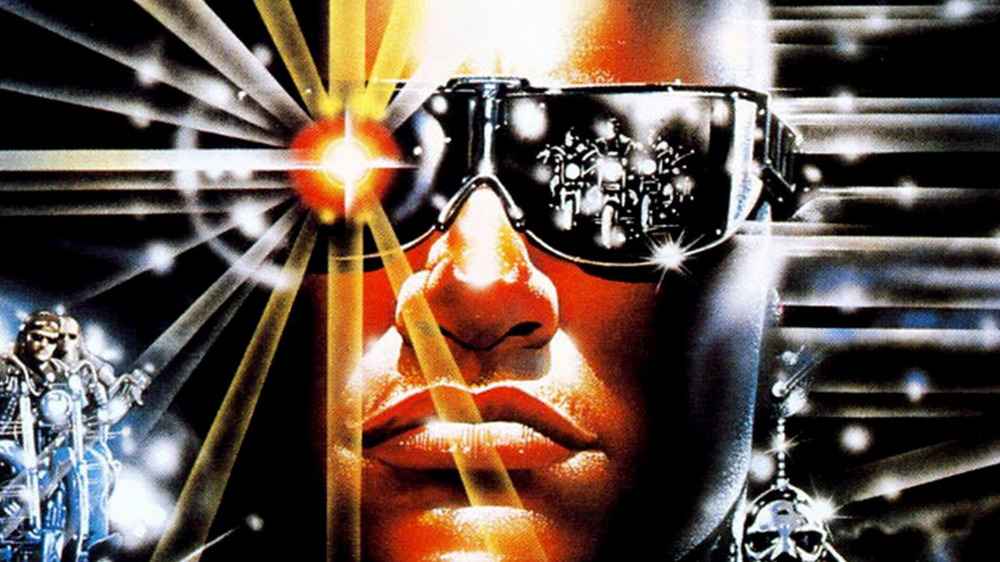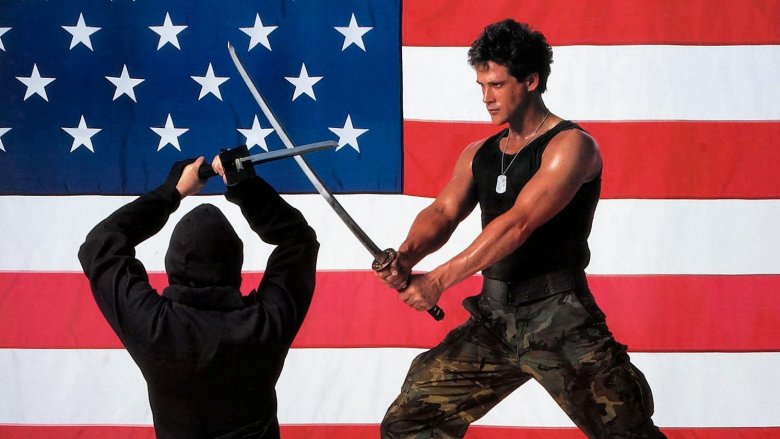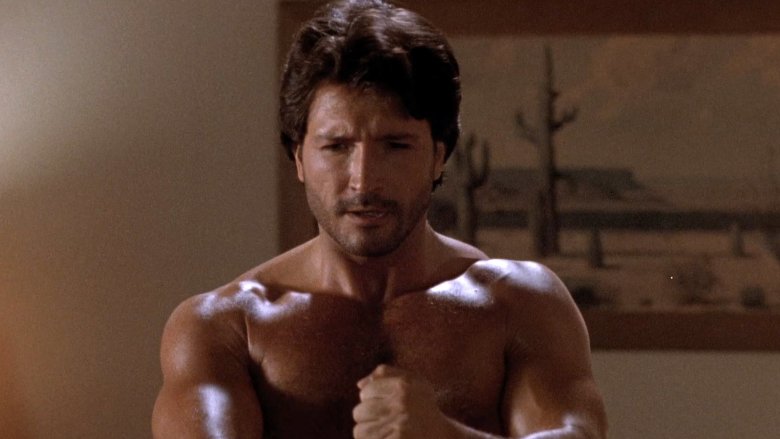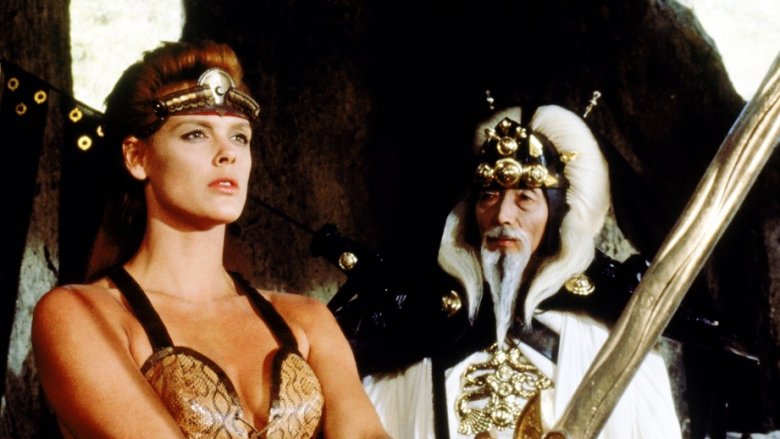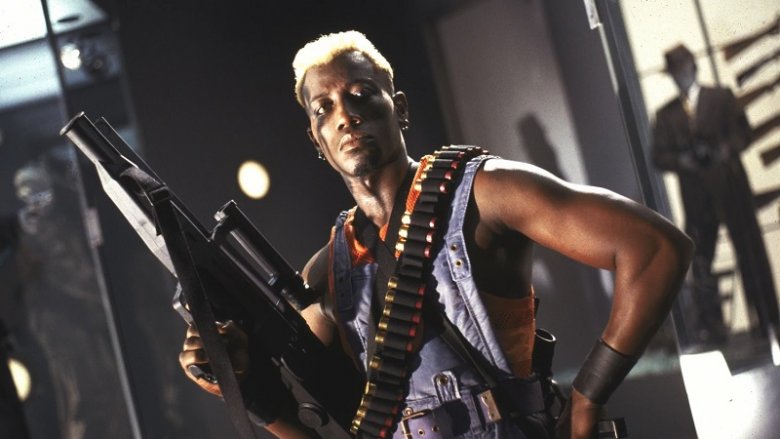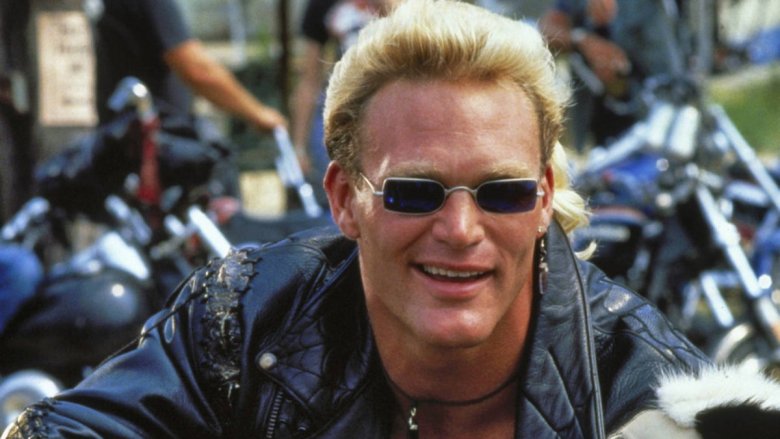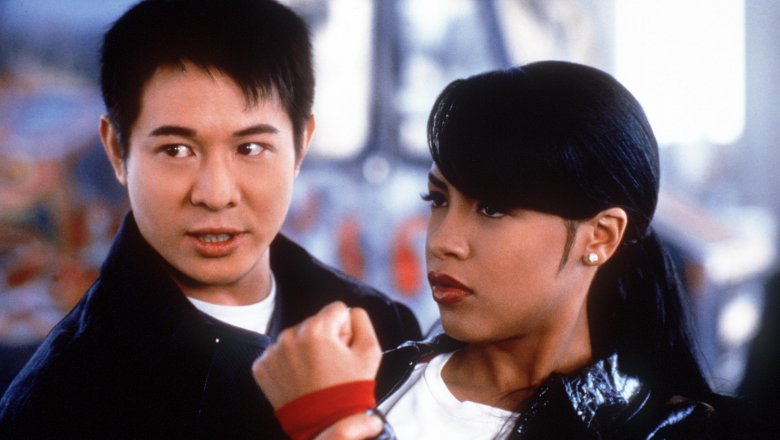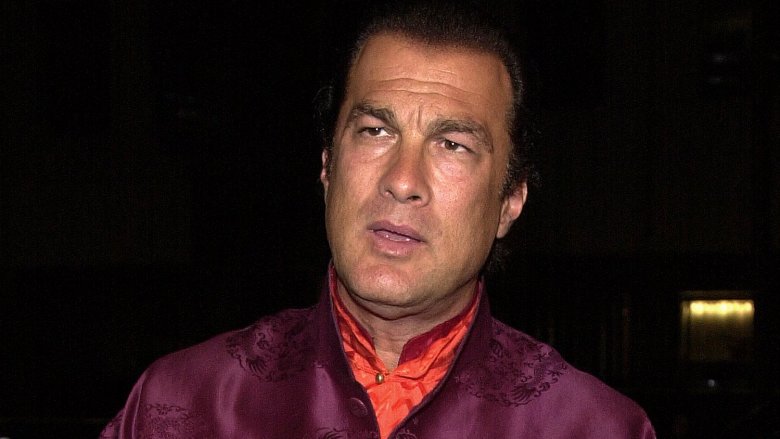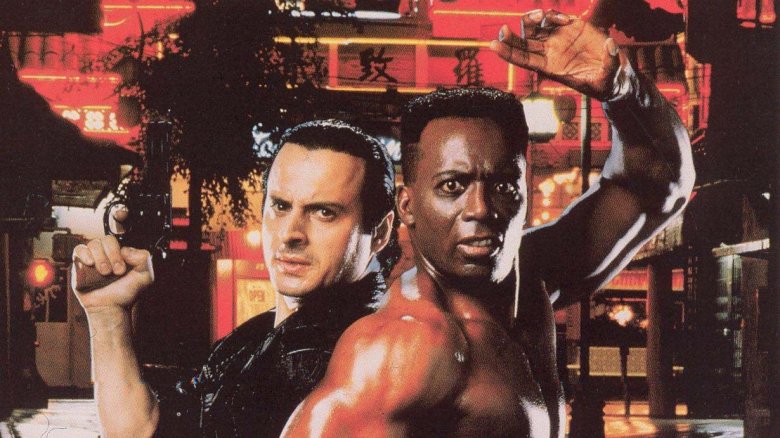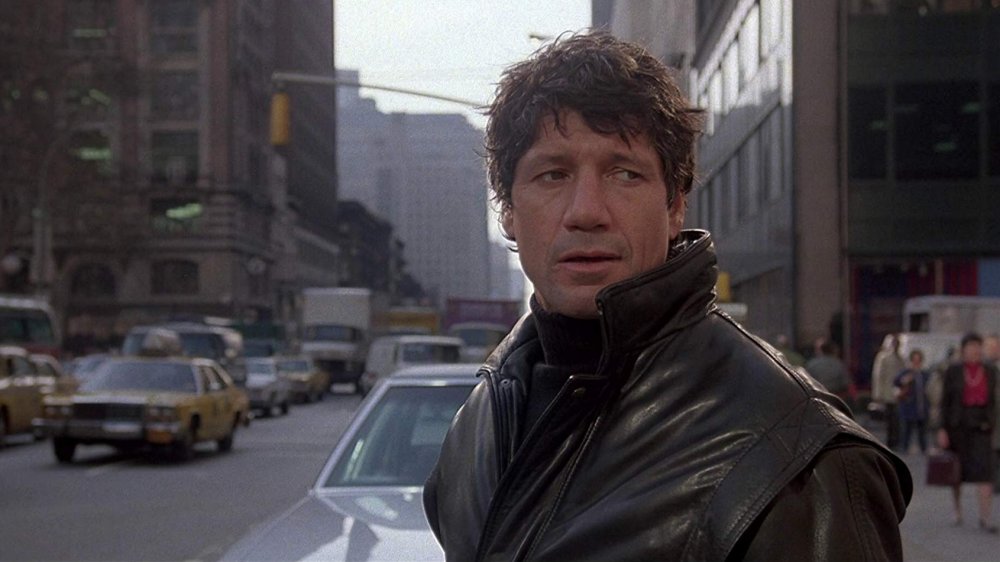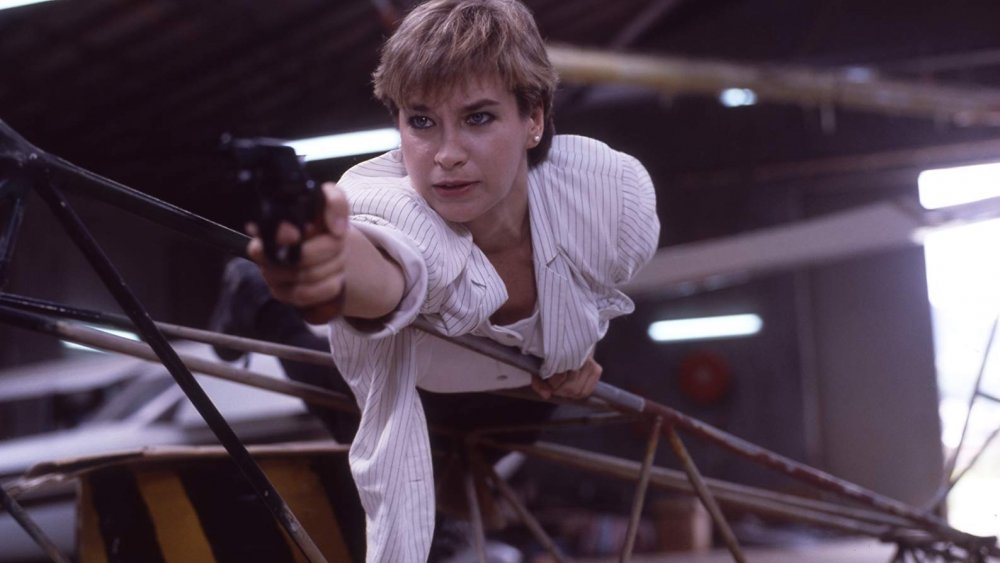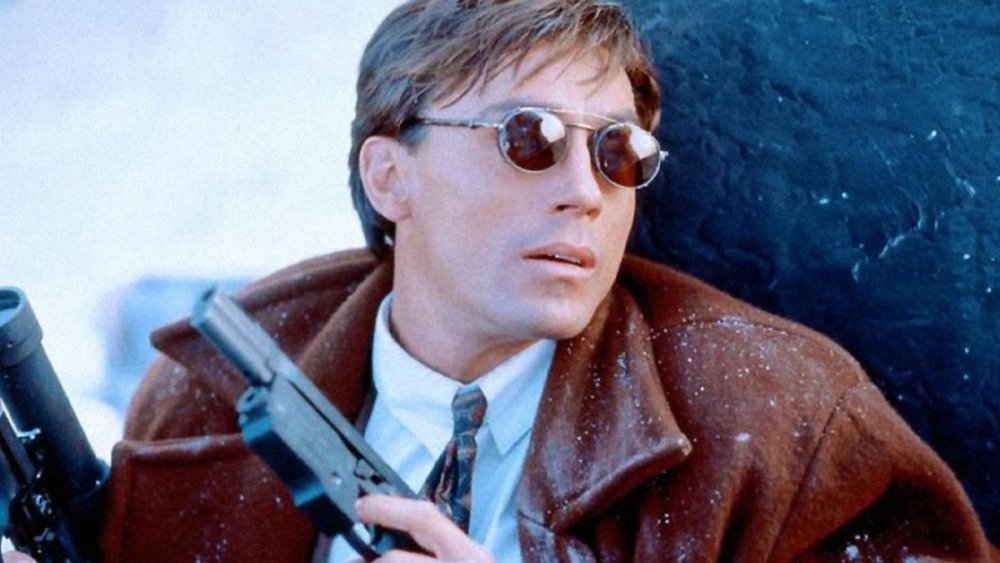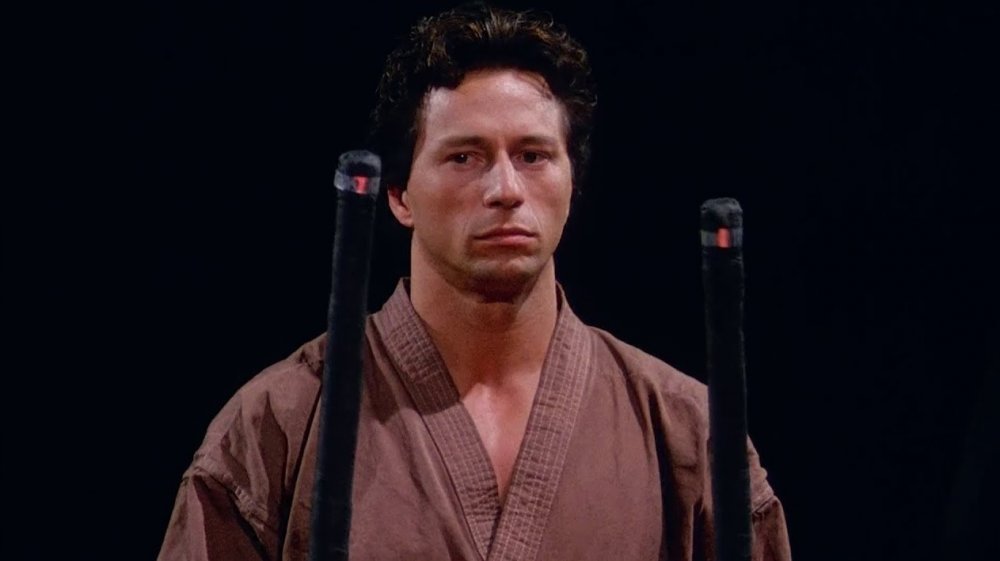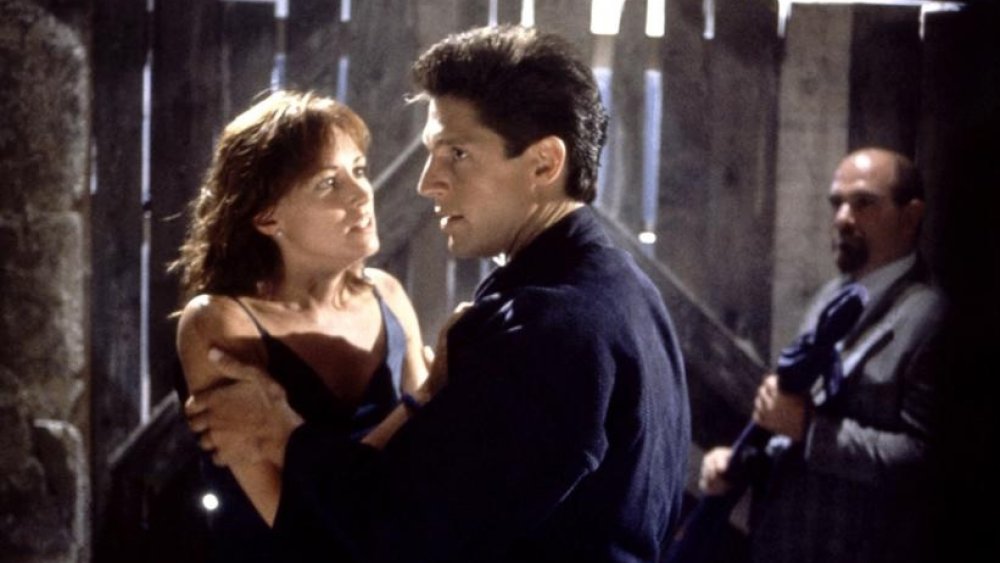Why Hollywood Won't Cast These Action Stars Anymore
Hollywood is an ever-changing landscape, and nobody knows that better than action stars of years gone by. In the '80s and '90s, all you really needed to get an action flick greenlit was a musclebound actor capable of delivering a few lines of dialogue between beatdowns, and that type of star was in ready supply. Arnold Schwarzenegger and Sylvester Stallone emerged as the power players in the genre, becoming household names in Hollywood; they simply chose their roles well, and as a result, both men's names still hold some weight in the movie industry today — but not every action hero from that time period was quite as lucky.
While action stars still exist in Hollywood today (WWE superstar turned box office big-hitter Dwayne "The Rock" Johnson being the most obvious example), you can't skate by on physicality alone. From world karate champions to kung fu prodigies, these actors were born to be action heroes, but for one reason or another, they all wore out their welcome in Hollywood.
Michael Dudikoff
Michael Dudikoff spent years feeding off bit parts before he won the role of Private Joe T. Armstrong in 1985's American Ninja, which marked the beginning of his time as the golden boy of Cannon Films. American Ninja was just one of the many low-budget releases that Dudikoff starred in for Cannon, notorious purveyors of B-movie action. Studio owners Menahem Golan and Yoram Globus managed to keep him at Cannon by promising him the kinds of roles that actors would snap your hand off for today.
"There were so many things I was told I was going to be," Dudikoff told Coming Soon. "I was going to be Superman; I was going to be Spider-Man. At one point they said they were going to put me together with Charlie Bronson in a picture and that's what I really wanted to do. That never did happen, but they were working on it." He fronted such schlock classics as Avenging Force and Platoon Leader in the years following American Ninja, though Dudikoff never got the chance to play a superhero.
Cannon bought the rights to Superman at a steal, but they managed to convince Christopher Reeve to reprise the role in the much-maligned Superman IV: The Quest for Peace. Dudikoff went on to make more American Ninja movies, which he remains best known for today. He does still get the odd part, however; as he put it, "I'd like to work a little more, but I'm here."
Jeff Speakman
Jeff Speakman could have been a household name today, but the Kenpō expert failed to capitalize on his "strong and entertaining" debut, 1991's The Perfect Weapon. "Speakman really explodes with a great screen presence and it would have been great to see him show up in larger scale action pictures," Felix Vasquez of Cinema Crazed wrote after revisiting the movie in 2014. Sadly, Speakman never got the chance to show what he could do with a decent script and a blockbuster budget behind him.
Speakman had a three-picture deal with Paramount, but changes were afoot within the studio. The project that was being developed as his follow-up vehicle was accidentally sold to Fox, who refused to sell it back. "They made that movie, which was supposed to be my second movie at Paramount, and the name of that movie was Speed," Speakman revealed to The Action Elite. "It was the movie that made Keanu Reeves a star... We lost it. And consequently, there went my career."
The movie that Speakman wound up doing instead was the "almost pleasureless" Street Knight, which dropped two years after The Perfect Weapon. That might not seem like a significant absence, but countless similar movies came out in that time. Street Knight got lost in the noise, and so did Speakman. He was diagnosed with throat cancer in 2013, but he did what he does best and fought it — by 2014, he'd been given the all clear.
Brigitte Nielsen
When Danish model Brigitte Nielsen was offered the chance to transition into movies, she had a tough decision to make. Her first marriage was over and she had a young child to look after, but the part was too big to decline. "I let my parents bring up my son Julian to pursue my Hollywood dream," she told The Guardian. "I had just finished breastfeeding him and I got the opportunity to appear in a movie called Red Sonja with Arnold Schwarzenegger."
Soon after portraying the sword-wielding Marvel heroine, Nielsen appeared in Rocky IV with Schwarzenegger's rival, Sylvester Stallone. Sly became her second husband and they starred alongside each other in 1986's Cobra before calling it quits. Speaking to People in 1987, a friend of Stallone claimed that Nielsen used the action star as "a stepping-stone for her career," and for a while it seemed to have worked.
The statuesque blonde went on to appear in 1987's Beverly Hills Cop II and fronted a number of (largely forgettable) action movies throughout the '90s, but the A-list status she coveted in those early days slowly slipped away. Today, Nielsen is best known for her stints on various reality TV shows and her very public battle with alcoholism, but she seems to have turned that around — in June 2018, she gave birth to her first daughter (and fifth child in total) at the age of 54. She might not be getting the roles anymore, but she remains a superwoman in real life.
Wesley Snipes
Wesley Snipes wasn't the first African-American to front a superhero movie — that honor belongs to Shaquille O'Neal, though nobody would judge you for forgetting all about Steel. It's hard to believe that Blade came out just a year later, because the Marvel vampire movie was a cut above Steel in every department. It certainly wasn't perfect, but Snipes' charisma and physical prowess turned it into a cult classic that would spawn two sequels — one that was relatively enjoyable, and one that was downright awful.
Snipes' behavior on the set of Blade: Trinity is now a thing of legend. Speaking to AV Club, Patton Oswalt revealed how the leading man fell out with director David S. Goyer big time. According to Oswalt, Snipes tried to strangle Goyer at one stage, which led to the director hiring a bunch of local bikers as bodyguards. The Demolition Man villain would apparently only communicate with the director through Post-It notes from that point on, signing off each one with "From Blade."
Biker gangs and on-set feuds turned out to be the least of Snipes' worries. He wound up serving two years behind bars after he was found guilty of tax evasion, bringing his time as an A-list action star to an end. He has hinted that he might return to the role of Blade now that comic book movies are considered mainstream, but there's every chance that Marvel Studios will cast a different actor.
Brian Bosworth
Brian Bosworth was playing the villain long before his path led him to Hollywood. An All-American at the University of Oklahoma, "The Boz" was the best young linebacker in the country at the time, but he was also the most controversial. According to CBN, the NCAA banned Bosworth from competing in the 1987 Orange Bowl after he tested positive for steroids. In protest, he attended a nationally televised game wearing a t-shirt with a derogatory slogan across the front.
Despite these antics, Bosworth was picked up by the Seattle Seahawks and went on to play three seasons in the NFL before a shoulder injury forced him to look for a new calling in life. That calling probably wasn't Hollywood, but not many producers are big enough to say "no" to the Boz, and he was cast as an Alabama cop at war with a biker gang in 1991's Stone Cold, in which he was upstaged by Lance Henrikson.
"Henriksen, as the maniacal lead biker, steals the movie from under Bosworth's nose," Time Out said (via Rotten Tomatoes). The Washington Post was equally unimpressed with Bosworth's debut, claiming that Stone Cold carried "about the same wallop The Boz did in the late stages of his very brief career in professional football." Bosworth appeared in a string of supporting tough-guy roles as the '90s faded, taking his career with it. He found Jesus later in life and still pops up in the occasional faith-based movie.
Jet Li
Jet Li was just 11 years old when a producer stumbled across him giving a kung fu demonstration in Hong Kong. The legendary Bruce Lee had recently passed away, and the hunt for fresh talent was underway. Impressed with Li's skills, the producer came back to visit him every year to check his progress. He was 17 when the exec decided he was old enough to start making movies, and before long he was a star in his native China.
Li's first American movie was 1998's Lethal Weapon 4, in which he played high-ranking Triad Wah Sing Ku. It was an unusual role for him (he was used to playing the good guy in China), but he didn't have to wait long for his first hero role: in 2000, Romeo Must Die was a modest hit for Li, finishing a close second to Erin Brockovich at the box office in its opening weekend. Entertainment Weekly predicted that a sequel would be greenlit, but the tragic death of Li's co-star Aaliyah put that idea to bed.
Li remained a hot property in Hollywood for a while (he was even offered a role in the Matrix sequels) but the actor and his family were almost killed in the Boxing Day tsunami of 2004, and seeing the destruction first hand made him want to dedicate his time to philanthropy rather than filmmaking. Rumors of his health failing turned out to be exaggerated, but his time as an action hero is undoubtedly over.
Steven Seagal
Steven Seagal is better known than the majority of actors we've discussed here, but not necessarily for the right reasons. The talented martial artist (he's a 7th dan in Aikido) burst onto the action scene with 1988's Above the Law, later hailed as "one of a handful of Steven Seagal films with an appeal extending beyond Seagal's hardcore fans" by Rotten Tomatoes, whose network of critics were split on the movie. That wasn't the case with 1992's Under Siege, however.
With a Tomatometer score of 77 percent, this battleship-set action thriller remains Seagal's most popular offering. As an action hero, he simply peaked too soon. Any hope he had of keeping pace with Schwarzenegger and Stallone was crushed over the decade that followed. 2003's The Foreigner scored an incredible zero percent, going direct-to-video and effectively turning Seagal into a glorified B-movie actor overnight. Many critics suggested that he just wasn't dedicated enough to be an action hero anymore. "He seems to have gotten so large that stunt doubles are needed for some of the more complicated fight sequences," Reel Film's David Nusair said in his review of The Foreigner.
Seagal has continued to churn out low-budget action movies, but Hollywood studios haven't given him a second thought for a long time, and that isn't likely to change considering the allegations levied against him. In 2018, two woman accused the fallen movie star of rape and sexual assault, which he denies.
Billy Blanks
After struggling through school with what doctors later confirmed was undiagnosed dyslexia, Billy Blanks turned away from the books and started to focus on martial arts. If he couldn't succeed academically he wanted to excel at karate instead, and excel he did. "Sooner or later, I started to see myself progress," he told CNN. "The next thing you know, I got my black belt before everybody in the class." He went on to become a seven-time world karate champion and attained black belts in several other martial arts before he decided he needed a new challenge — Hollywood.
Blanks had the fighting skills to make it as an action star, but his lack of an education came back to haunt him. "I was very lucky and very blessed to have a wife who could read really well," he said. "She took the script and she would read it to me and I would memorize it." With his wife's help, Blank was able to rub shoulders with some of the biggest names in the genre, appearing in Jet Li's The Master, Jean-Claude Van Damme's A.W.O.L, and the Bruce Willis-led action comedy The Last Boy Scout.
In 1992 he was finally rewarded with his first lead part, though Talons of the Eagle wasn't exactly star-maker material. Hollywood forgot about Blanks over the years that followed, and today he's best-known as the inventor of Tae Bo, a total body fitness system that he apparently came up with while listening to the Rocky soundtrack.
Fred Ward
Little-known character actor Fred Ward was poised to become Hollywood's next big action hero at one stage. A former boxer and military man, Ward's manly background and chiseled features made him an ideal fit for the genre. He moved to Rome to study acting after leaving the Air Force, dubbing Italian films in English for a time. His first American movie of any note was 1979's Escape From Alcatraz, in which he played one of the convicts trying to break out of the notorious island prison. He did enough in that picture to convince the Pacific Arts Corporation to cast him as the lead in its first feature film, 1982's Timerider: The Adventure of Lyle Swann.
In Timerider, Ward plays a dirt bike racer who accidentally travels back in time to the wild west, where a band of outlaws become obsessed with stealing his motorcycle. The movie was so bad that some critics walked out of the cinema, but Ward would be given one more shot at becoming a star. Unfortunately for him, 1985's Remo Williams: The Adventure Begins was just as terrible.
As the title suggests, the film was supposed to launch a franchise. Orion Pictures reportedly wanted to create an American James Bond, but Remo Williams (based on the Destroyer series of novels) bombed hard and sequels never materialized. "They could have made Rambo," Destroyer author Warren Murphy said (via Ultimate Action Movies). "Instead, they made Dumbo." Ward's brief stint as a leading man was over.
Cynthia Rothrock
When representatives from Hong Kong production company Golden Harvest traveled to the States in search of the next Bruce Lee in 1983, nobody expected them to recruit a female martial artist. The Hong Kong film industry was dominated by men back then, but that had never stopped Cynthia Rothrock before. The Delaware native became the first woman to be featured on the cover of Black Belt Magazine after she won and successfully defended her karate title against competitors of the opposite sex (there was no female division at the time) for several years running. Golden Harvest recognized her cinematic potential and signed her up to a three-movie deal.
Rothrock proved extremely popular with moviegoers in Hong Kong, where she became known as the Blonde Fury. She ended up making a total of ten movies overseas before returning to America to launch an assault on Hollywood. "I think U.S. audiences are ready to accept a woman in the role of action hero," Rothrock told Entertainment Weekly in 1991. Sadly, she was mistaken.
Despite her pedigree, Rothrock was made to play second fiddle to male stars in the vast majority of her American movies. "What I recall is that it was decided that women action stars weren't going to make money," she told Bristol Bad Film Club in 2017, long after Hollywood had lost interest. She half expected to get a call when The Expendables brought a bunch of action stars from years gone by together, but it never came.
Olivier Gruner
French actor Olivier Gruner began his martial arts training at the age of 11 after he grew tired of being targeted by bullies. "I got beat up a lot," he told Movie Mavericks. "One day after school I was attacked and I decided to learn martial arts to defend myself." The Paris native joined the military after graduating, becoming a member of an elite unit that was "very similar to the Navy Seals in the American military." When his military career came to an end he got into prizefighting and worked the odd security job. One such job would change his life forever.
In 1987, Gruner landed a security gig at Cannes. In a savvy act of self-promotion, the kickboxer decided to put up posters of himself around the film festival. Someone from Imperial Entertainment saw one of his posters and decided to cast him in a role that was originally meant for Jean-Claude Van Damme. "They produced my first film, Angel Town (1990), which did extremely well," Gruner said. "Then we did Nemesis (1992), which did even better. The problem was that they didn't know what to do with me next."
There was a three-year gap between Nemesis and Gruner's next film, 1995's Automatic. "That really hurt my popularity," the Frenchman said. "You have to consistently be out there." He continued to feature in low-budget action flicks in the years that followed, but when it comes to Hollywood stardom, Gruner had missed the boat.
Jeff Wincott
When he sat down with UPI in 1995, Canadian actor and martial artist Jeff Wincott stated that his goal was to become "the biggest motion picture action star in Hollywood." He had fronted a total of 11 action flicks by that point, but they'd all gone straight to video. "They are released in theaters abroad, but not here," he added. "Everyone wonders why, and so do I." The answer might seem obvious (films with titles like When the Bullet Hits the Bone are made with a certain audience in mind, after all), but the action genre was booming at the time and Wincott was the full package — not only was he Canada's taekwondo champion, he trained under Stella Adler at the world famous Juilliard School.
Wincott always considered himself an actor first and a fighter second. Hollywood didn't see it that way, however. The Toronto native made a ton of low-to-mid-budget action movies in the '90s, but when the decade came to an end, casting directors quickly lost interest. In later years he earned his crust with bit-parts in TV shows like 24, The Wire and Sons of Anarchy, but feature films are now a thing of the past for Wincott (he auditioned for a role in Jake Gyllenhaal boxing movie Southpaw, but didn't get it). He still stars in short movies, but to say they get produced on a shoestring budget would be a massive understatement — 2016's Behind Bars cost $33 to make.
David Bradley
Texan actor David Bradley replaced Michael Dudikoff in the American Ninja series when the latter tried (in vain) to move onto bigger things. Bradley, a former car salesman skilled in Karate, Kempo, Tai Chi and Aikido, made his debut in 1989's American Ninja 3: Blood Hunt. The sequel had a lower budget than the previous two installments, and it showed. "The fights aren't nearly as interestingly staged or performed this time around, and the stuff in between is even worse," Cinapse said when the film was released on Blu-ray in 2016.
Bradley starred in the next two American Ninja movies before taking on the role of Jack Ryan (no, not that Jack Ryan) in 1993's Cyborg Cop and its sequel, released the following year. Nu Image had high hopes for the franchise, but once again Bradley failed to capture the imagination. "The star is unappealing, the acting is wooden and the story about a death row inmate being chosen for this cyborg experiment leaves you scratching your head," Bullet Proof Action said in its review of Cyborg Cop II.
According to Cyborg Cop II director Sam Firstenberg, Bradley fell off the radar after the release of 1997's Crisis, his final film. "David disappeared," Firstenberg told Cool Ass Cinema in 2017. "He is in Texas teaching martial arts somewhere but nobody knows where he is. [...] The guy who is writing the book now about my movies, Stories From the Trenches, tried very hard to find David, but couldn't."
